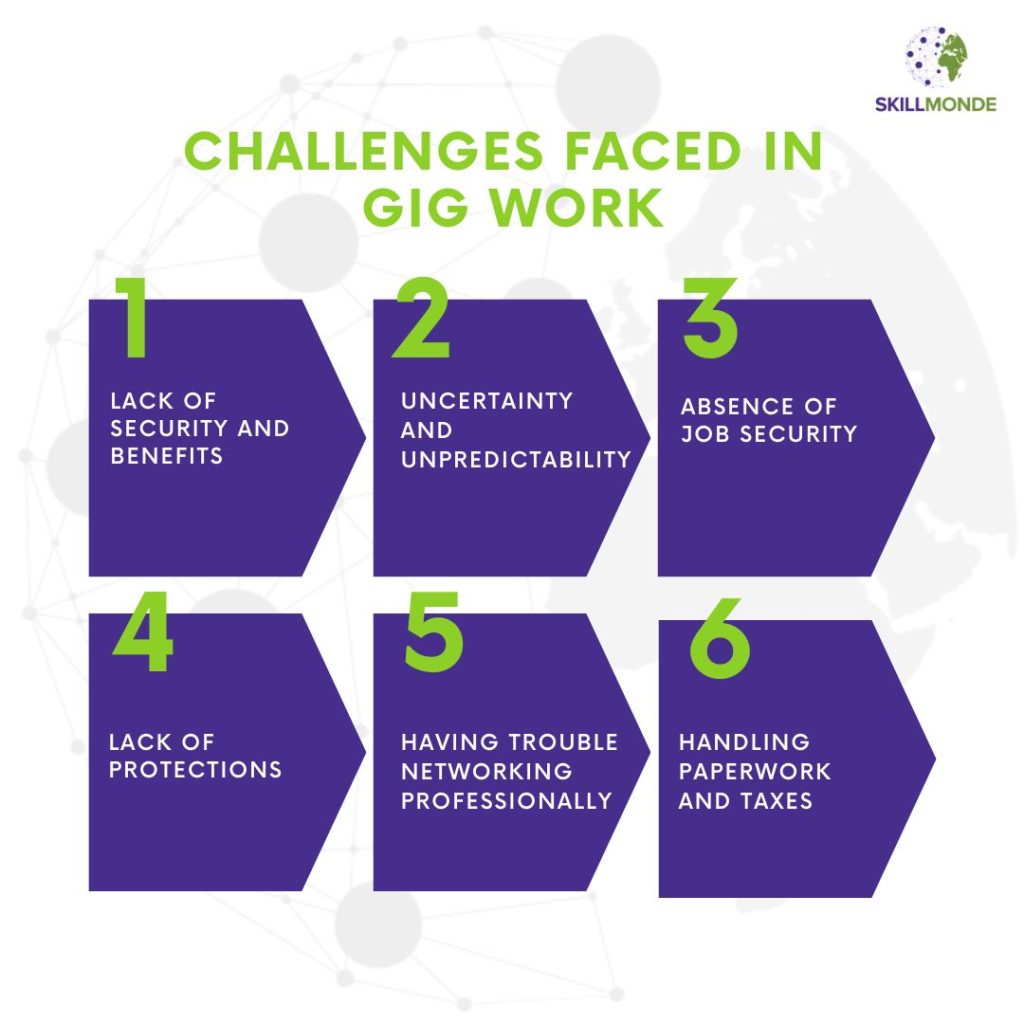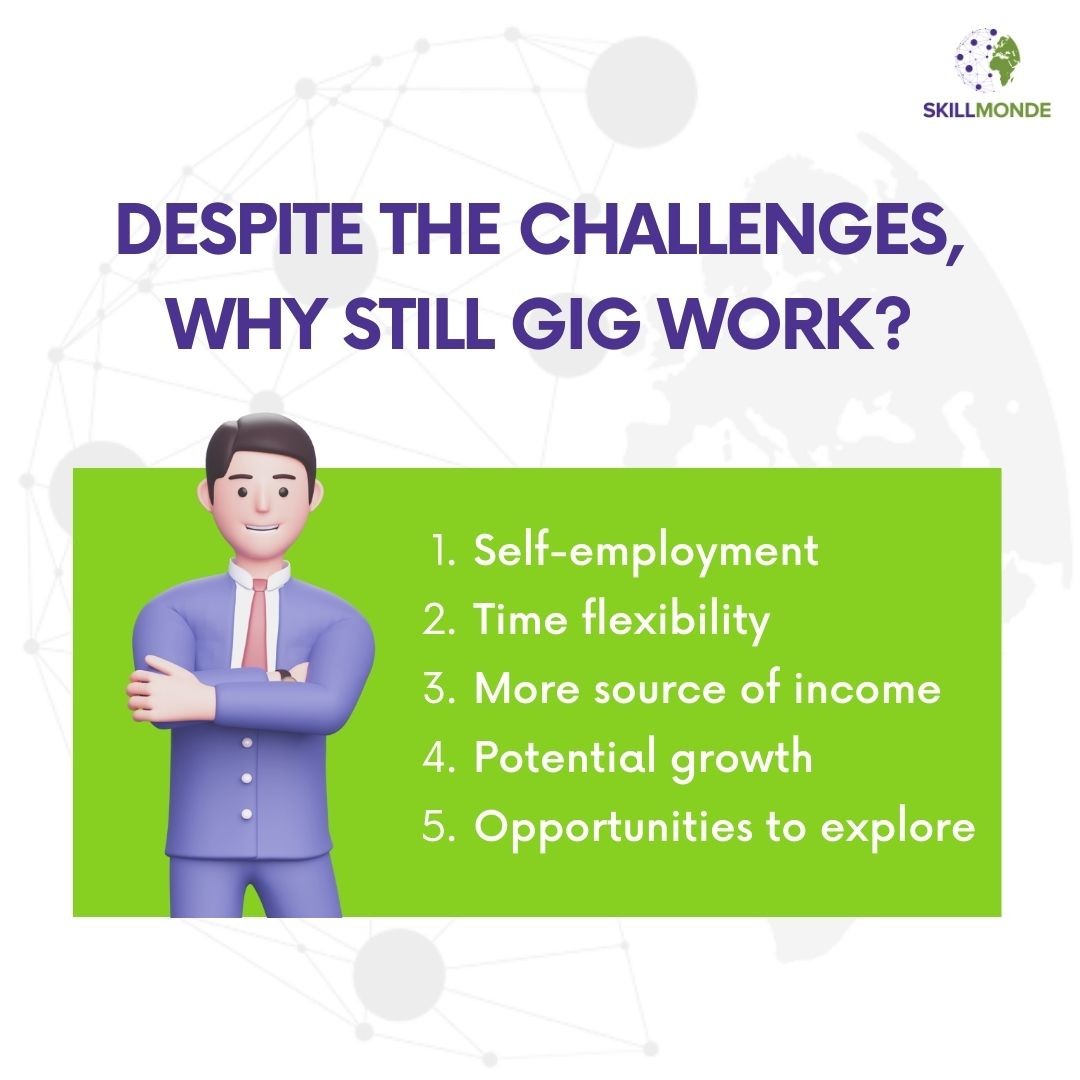A gig work is frequently used to refer to work that is performed under a contract or as a freelancer rather than as a long-term employee of an organization. A wide range of jobs, including writing, designing, organizing events, and providing services to people or companies, can be classified as gig work. Gig workers may be self-employed or hired by businesses that focus on offering contract or temporary labour.
The term "work gig," which is also used to refer to gig work or the gig economy, describes the rising trend of people doing temporary or short-time employment rather than the more conventional long-term ones. Gig workers may be self-employed or hired by businesses that focus on offering contract or temporary labour.
Tasks and industries that fall under the category of gig employment include writing, design, event planning, ride-sharing, delivery, and offering services to both individuals and companies. Compensate gig workers by a project or job, instead of getting a regular salary or hourly compensation.
The growth of online platforms and apps that link gig workers with potential clients or customers has contributed to the growth of the gig economy. These platforms make it simple and quick for people to discover and finish gig work, frequently with the ease of working from home or around their schedule.
Challenges faced in Gig Work:

Gig work, though, can also provide a unique set of difficulties. The stability and benefits that come with regular employment, like health insurance, retirement plans, and paid time off, may not be available to gig workers. Additionally, they can have uncertainty and unpredictability regarding when and how much employment will be available.
The following are some difficulties that gig workers could experience:
Lack of security and benefits:
Working as a freelancer can be unpredictable. There is no guarantee of a consistent income or of benefits like health coverage or pension schemes.
Uncertainty and unpredictability:
It can be unpleasant for gig workers not knowing how long they will have work in hand. The concern for the volume of work to keep them sufficient until the next engagement is another issue. It becomes a challenge to gig workers to look out for and maintain long-term plans and engagement.
Absence of job security:
Gig workers may not have the same level of job security as those who work as regular employees. Because gig labour is usually transitory or short-term.
Lack of protections:
Absence of entitlement to the same legal provisions as regular employees, such as the entitlement to overtime compensation, the minimum wage, or provident fund.
Having trouble networking professionally:
Because gig work can be solitary, some people may find it difficult to network professionally or locate opportunities for promotion. Freelancing may often land you jobs in isolation that have zero scopes for networking with co-workers which as a result may affect your professional growth.
Handling paperwork and taxes:
Since the likelihood of working in a gig is solitary, you are your own master and slave. You deal with the paper works and all other related works. Gig workers can be in charge of their own taxes and paperwork, which can be difficult and time-consuming.
How is it performing in the market?
The growth of online applications and platforms that link gig workers with potential customers or prospects has contributed to the growth of the gig economy. These platforms make it simple and quick for people to discover and finish gig work, frequently with the ease of working from home or around their schedule.
The gig economy has, nonetheless, come under fire and stirred up debate. Gig jobs, according to some, can be unstable and lack the advantages and stability of full-time work. Concerns concerning the impact of gig labor on established occupations and industries exists. The absence of legal rights and safeguards for gig workers have also been raised.
Why is Gig work preferred over other engagement?
The gig economy is a complicated and dynamic aspect of the contemporary workforce overall. For both employees and businesses, it presents fresh opportunities and difficulties. And as technology and the labor market advance, gig market changes.
Amidst these debates and disagreements, people still choose gig work because of its working flexibility and ability to work on one’s terms and conditions. Gig employment may be a beneficial choice for people who want to set their schedules, be the bosses, or experiment with different types of work.
In general, the gig economy is a developing and crucial component of contemporary labour. As we see development in technology and the labour market, it also presents fresh opportunities and problems for both employees and businesses.
FAQs :
1. How do gig jobs work?
- A sort of employment known as "gig work" involves people working on a temporary, contract-based, or freelance basis to finish particular tasks or projects for a customer. Instead of getting paid on hourly or salary basis, the pay is sometimes for each project or task completed. Freelance writing, graphic design, and website building are a few examples of gig labour.
2. What distinguishes gig work from traditional employment?
- Gig workers are often self-employed and work on a project or task basis rather than on a regular schedule. This is how gig labour differs from traditional employment. However, most gig workers do not have access to benefits like health insurance or retirement plans. Workers on gig contracts are in charge of covering their own taxes.
3. Who may perform gig work?
- As long as they have the knowledge and resources necessary for the particular assignment, anyone can work on a contract basis. Some gig jobs, working as a freelance accountant, call for specific certificates or licences.
4. What advantages do gig jobs offer?
- The advantages of gig labour include schedule flexibility, the opportunity to work from any location with an internet connection, and the chance to make more money than you would in a typical job. Gig labor offers wide range of projects as well as learning new skills.
5. What are the drawbacks of contract work?
- There is no assurance of a continuous income or job stability with gig employment, which can be unpredictable and inconsistent. Moreover, benefits like health insurance, paid time off, and retirement savings programmes are frequently unavailable to gig workers.
6. Does everyone find gig employment to be a decent option?
- Gig labour is for those people who value flexibility and ready to accept the risks associated with working as an independent contractor. Yet, it might not be appropriate for those who need a steady source of income and benefits or who can't handle the ambiguity of gig labour.
